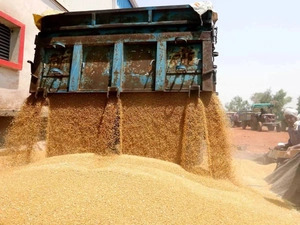Following India’s export prohibition, Bangladesh attempted to get supply through international auctions but had to cancel them due to excessive pricing. As Bangladesh’s Wheat exports halted by India.
- Last month, India prohibited grain shipments to Bangladesh in order to keep domestic prices stable.
- Bangladesh is attempting to obtain Russian wheat shipments.
A new source to obtain wheat imports.

Bangladesh is attempting to gain wheat imports from Russia through a government-to-government agreement.
After its largest supplier, India, restricted wheat exports last month in order to keep local prices stable, government and trade sources told Reuters on Wednesday.
According to industry officials, the supply agreement with Russia, the world’s largest wheat exporter, might help Dhaka satisfy its demands at lower worldwide rates.
According to a senior official with Bangladesh’s food ministry, Bangladesh will conduct a virtual conference with Russia on Thursday to finalize the agreement.
“We’ll initially seek at least 200,000 tones of wheat from Russia,” stated the unnamed official.
The Ministry of Food did not reply quickly to a request for comment. Bangladesh imports approximately 7 million tonnes of wheat each year, with India accounting for more than two-thirds of that total.
Following India’s export prohibition, Bangladesh attempted to get supply through international auctions but had to cancel them due to excessive pricing.
Why were Bangladesh’s Wheat exports halted by India?
Bangladesh was paying less than $400 per ton for Indian wheat on a cost and freight basis before the ban, but following the embargo, alternative suppliers began bidding above $460, raising local prices in Bangladesh, according to a Mumbai-based dealer with a global trading business.
The Bangladesh government is battling to keep commodities prices under control, with inflation reaching an eight-year high in May and the country’s wheat reserves falling to their lowest level in three years, at 166,000 tonnes.
“Many nations can supply wheat to Bangladesh, but the main issue is pricing. Russia can provide a discount off of global rates “said a trader with a multinational trading organization located in New Delhi.
However, given Western sanctions on Russia, paying for Russian wheat would be difficult for Dhaka. “During the meeting, all topics, including payment, will be discussed. Let’s watch what happens, “a government official stated.
Bangladesh would buy a limited amount of Russian wheat at first and will expand its purchases if “everything goes smoothly on the organizing shipments and payment front,” according to the New Delhi-based trader.
Read About:- Iran to supply Russia with hundreds of drones, alleges US
Cause and Effect of Bangladesh’s Wheat exports halted by India
Following concerns that its decision to limit wheat exports might aggravate the global food supply situation in the aftermath of the Ukraine war, India has defended its stance.
“If everyone begins imposing export limits… the situation will grow,” German Food and Agriculture Minister Cem Ozdemir warned after the embargo was issued in May.
However, India’s Commerce Minister, Piyush Goyal, claims that the export restriction should have little effect on world markets because the country is not a large wheat exporter.
The embargo was issued in India on May 13th, after extremely hot weather damaged the wheat harvest, sending local prices skyrocketing.
Despite the fact that India is not a large wheat exporter, the action shook global markets, with the Chicago benchmark wheat index surging nearly 6%.
Wheat prices, like other food costs, have surged throughout March and April following Russia’s invasion of Ukraine. Because of the disruption created by the war, millions of tons of wheat have been unable to leave Ukraine, one of the world’s largest exporters.
According to Kelly Goughary of the farm data analysis firm Gro Intelligence, India’s prohibition caused a further price increase since “global customers were relying on supply from India after shipments from the Black Sea area plummeted.”
Although India is the world’s second-largest wheat producer, it accounts for less than 1% of global wheat commerce. It maintains a large portion of it to subsidize food for the poor.
However, just before the embargo was announced, India was planning to increase exports by shipping a record 10 million tonnes of wheat this year, up from two million the previous year.
It was supplying new markets in Asia and Africa, and even after the prohibition, numerous governments indicated they were in contact with India to maintain exports.
Also Read:-Russian lawmakers propose extending ‘gay propaganda’ law to all adults













